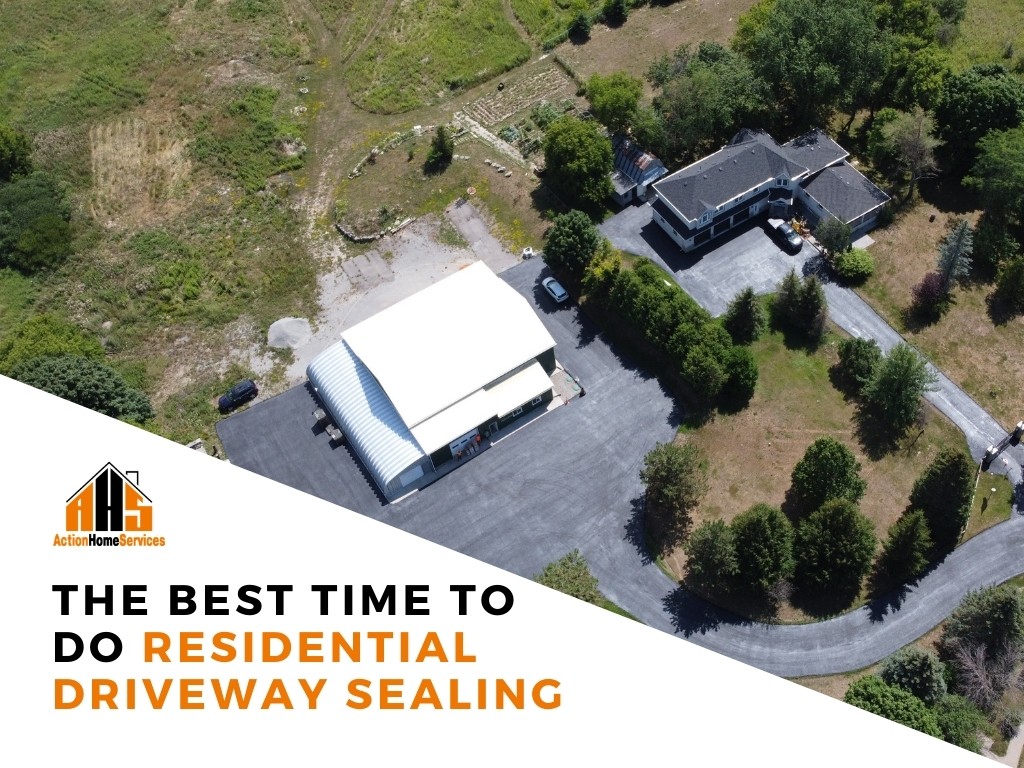
Your residential driveway isn’t just a convenient space to park your car, nor is it simply an opportunity to enhance your curb appeal. Whether you have asphalt, concrete or interlocking pavers sprawled across your driveway - each type could benefit from residential driveway sealing.
Before going any further, it is important to mention that you should always speak to your driveway manufacturer or our experts at AHS to get information about your current driveway materials, prior to sealing. Some materials, such as certain interlocking stones, come pre-sealed and will not require additional sealing, while others may not contain any sealing at all. Additionally, depending on the material, chemical reactions could occur if layers of sealant are applied which could result in extra slippery surfaces and other undesirable outcomes.
If required, the cost of sealing will depend on a number of factors, such as the stone type, stone size, square footage, and layout. Regardless of whether you choose to take on the job yourself or hire a professional, costs could include a powerwasher (to rent), polymeric sand, sealer, labour, time, and so on. You could be looking at anywhere between a few hundred to a few thousand dollars.
Why seal my driveway?
Well there are a number of reasons sealing a driveway is important, and recommended. The most important reason is simply that by sealing, you extend the longevity of your driveway and deter circumstances that require a total replacement of your driveway or any type of massive repairs. Keep in mind, your pavement - the driveway - is not a small investment, especially if you have splurged on top-coating your asphalt, or replaced the original pavement with concrete or interlocking pavers.
Sealers are designed to protect and extend the life of your pavement. In technical terms, sealcoating prevents the sun from oxidizing the asphaltic binder. This essentially means that by ‘sealing’ your driveway, you are protecting it against damage caused by the elements (i.e. the sun), repelling it against water, as well as guarding it from damage caused by spills, gas and oil. Another great perk of sealing is that it also helps enhance your driveway because cracks and potholes, depressions, and such are unlikely to appear - which only increases curb appeal.
Clearly it’s a win-win situation. So the next question is, when is the best time to do it?
Many people agree that the best time to embark on the residential driveway sealing journey is during the spring, and the fall. In order to achieve proper curing, seal coats need a nightly temperature of a minimum of 50 degrees. However, bear in mind that you cannot follow through with a seal coat smack dab in the middle of autumn. A general rule of thumb is to get the seal coating done before the leaves start to fall - otherwise, those leaves may blow into the driveway, ruining the seal coat.
People often scurry to get the seal coating done in the fall because winter is around the corner. However, spring is the optimal time to get it done. The reason being, the warm spring weather harbors the perfect temperature for a well-set coat. The pavement isn’t scalding hot as it would be during the summer months, nor is it icy cold during the winter months. In addition, getting it done during spring allows you to enjoy your new seal coat for the entire upcoming year.
With spring right around the corner, now is the best time to start thinking about sealcoating your residential driveway. If you’ve never done it, it’s recommended that you get it done as soon as possible to avoid any unwanted expenses. If you had it sealed three years ago or so, you should probably get it resealed because the seal coating is likely deteriorating. In fact, it may have already deteriorated, making your driveway vulnerable to external factors that can easily cause damage; such as the elements, foot traffic and heavy materials.
Here at Action Home Services, our team has the knowledge and expertise to assess the condition of your driveway and propose the most optimal solution to your situation. We can even replace your driveway, so if you’re looking to switch from asphalt to concrete, or even interlocking pavers - we have you covered. Whether you reside in Toronto or the GTA, simply give us a call at (647) 937-1023 for a free estimate and let’s protect your residential driveway while enhancing your curb appeal.


